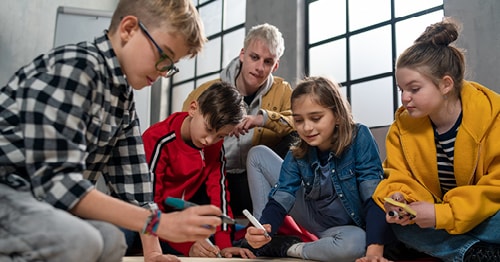How to Develop Leadership Skills in Virtual School
byKevin Neese
5 min to read
Does the prospect of helping your child develop their leadership skills during their online school journey seem overwhelming? If so, you're not alone. If your family has made the shift to online education, you may be wondering how to help your children continue to develop critical soft skills like leadership.
Despite what you may think, online learning environments can offer a unique platform for fostering leadership skills in students.
Understanding Leadership Skills for Kids
Leadership skills for kids don’t always mean being in charge. Leadership often goes beyond the traditional school leadership roles like being the class president or captain of a sports team. Leadership involves a range of skills like empathy, resilience, decision-making, problem-solving, and effective communication. These skills have a fundamental impact on the overall development of a child, shaping their character and equipping them for future challenges. Leadership skills also enhance a child's sense of self-confidence, improve their ability to work in a productive and cooperative way with their peers, and stimulate their critical thinking and creativity. In essence, leadership skills provide a robust foundation for a successful future both in and out of school.
The Role of Virtual Schools in Developing Leadership Skills
One common misconception about online schooling is that it is a solitary experience, leaving families unsure how they could go about developing leadership skills for kids. However, the reality is that virtual schools offer a wealth of experiences that can help enhance a child's leadership potential. From facilitating group projects to encouraging participation in online discussions, virtual schools equip students with the tools they need to become effective leaders.
In the early elementary school years, leadership skills mostly involve learning how to share, cooperate with others, and follow rules. Encouraging children to take turns leading in games or reading to their peers may help nurture early leadership abilities.
In late elementary school, leadership begins to focus on understanding complex social dynamics and taking on leadership roles, such as leading group projects. At this stage, empathy and problem-solving skills are crucial.
As students move into middle school, leadership can include managing conflict, making group decisions, and demonstrating resilience. Recognizing personal strengths and weaknesses within oneself is a key aspect of leadership development at this stage.
In high school, leadership includes strategic thinking, advanced problem-solving, and effective communication. Students should be encouraged to lead with more independence while handling complex tasks. Throughout the course of their education, leadership skills can enhance a student’s sense of self-confidence, improve cooperation, stimulate their critical thinking, and provide a solid foundation for a successful future.
Social Opportunities in Virtual Schooling
Virtual schools host a plethora of interactive activities that promote interaction among students, such as group projects, virtual meetups, and discussion forums. These platforms serve as excellent avenues for your child to practice and hone their leadership skills.
For instance, group projects encourage students to work together to achieve common goals. Here, students can take on different roles that involve responsibility and leadership like delegating tasks, making collective decisions, and resolving conflicts.
Virtual meetups provide an environment where students can communicate, collaborate, and form meaningful relationships with their peers. These meetups can be centered around various activities, like study groups or hobby clubs, giving your child a platform to step up by leading discussions.
Online discussion forums can also foster leadership. Here, students can ask thought-provoking questions and lead conversations on various topics they are interested in. Initiating discussions in class encourages them to voice their opinions confidently, consider different viewpoints, and cultivate a sense of respect for diversity—attributes of a great leader.
Participating in Virtual Clubs and Sports
Online clubs offer invaluable opportunities for kids to develop leadership skills. Virtual schools are increasingly facilitating clubs that cater to a wide array of interests. Whether it's a coding club, a digital art group, or a debate society, these platforms instill vital leadership skills for kids.
Leadership in such contexts involves directing a team, demonstrating responsibility, thinking strategically, and setting and achieving goals. By actively participating in these activities, your child learns to lead by example, explore their passions, motivates others, manages time efficiently, and learns the value of perseverance and resilience. Furthermore, these platforms also encourage children to learn from their failures, turning them into opportunities for growth, another crucial facet of leadership.

Community Involvement
Community involvement plays an integral role in holistic learning, and virtual schools are embracing this concept wholeheartedly. Activities may include volunteering in the community through outreach programs or organizing charity events. These initiatives can provide students with the chance to exercise their leadership skills in a real-world setting.
Volunteer opportunities can range from tutoring younger students to leading initiatives for environmental conservation. Such activities can instill children with a strong sense of social responsibility as well as increasing their empathy and their ability to motivate others.
Organizing charity events or participating in community outreach programs allows students to experience leadership from a broader perspective. They learn to mobilize resources, motivate others towards a common goal, and make significant decisions, all while making a positive impact on their community.
How to Build Leadership Skills Online
Here are a few strategies that can help you nurture your student’s leadership skills in online school:
Encourage Participation: Inspire your child to take part in group activities, clubs, sports, and community involvement programs. Explain to them the benefits these platforms offer in developing leadership skills, and let your child choose an activity that best fits their interests and aspirations.
Foster a Positive Environment: Create a supportive environment at home where your child feels comfortable and empowered to take risks, speak up, make decisions, and take on responsibilities.
Recognize and Reward: Acknowledge your student’s efforts and initiatives. Celebrate their achievements, no matter how small, and use setbacks as opportunities for learning.
Discuss Real-World Scenarios: Talk about leaders in different fields and how they demonstrate leadership skills. Encourage your child to reflect on these scenarios and apply these lessons in their activities.
Leverage Online Resources: Direct them to resources like online webinars, workshops, or courses that focus on leadership skills for kids.
Shaping Tomorrow's Leaders Through Online Education
Virtual school can provide countless opportunities for students to develop and refine their leadership skills. And by recognizing leadership opportunities and encouraging students to embrace them, each activity in their online schooling journey can be a steppingstone towards becoming better leaders.



